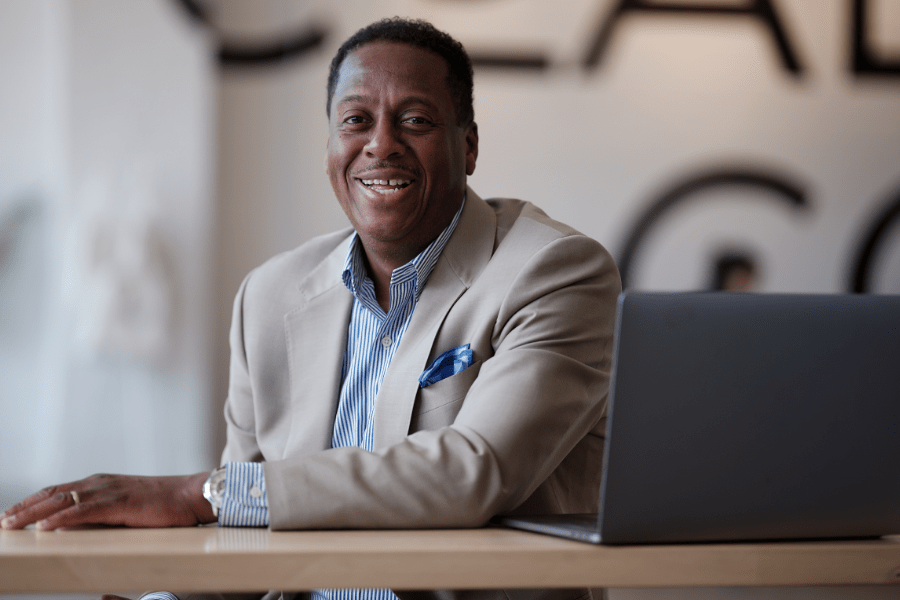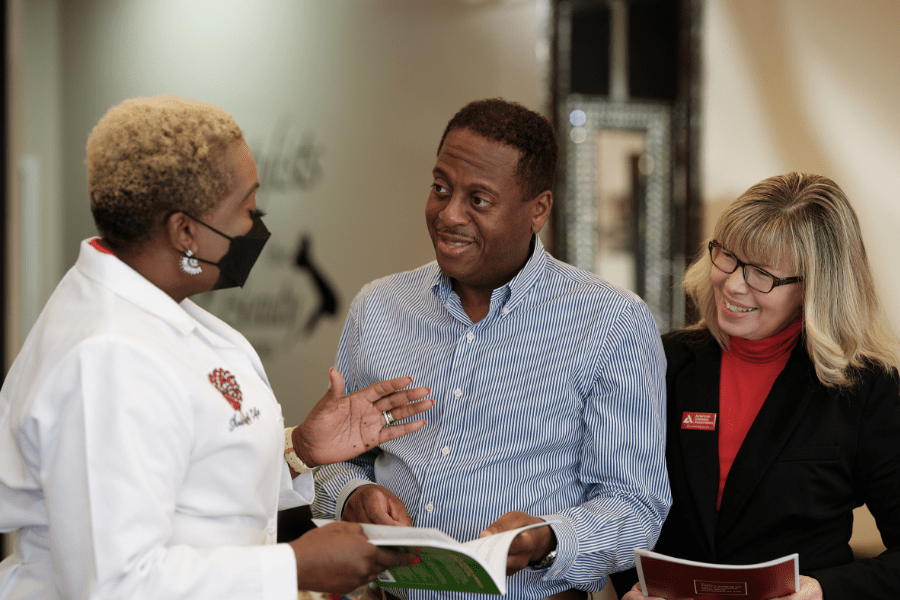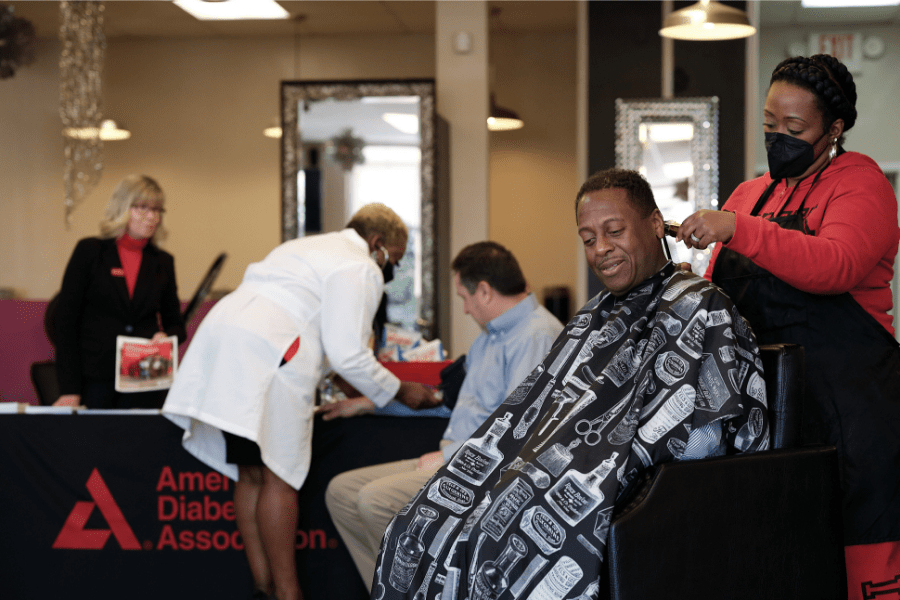
Mark Johnson has inspired his colleagues and bettered communities for decades. He’s helped raise hundreds of thousands of dollars for education, especially for the Black community. He even led the cast of the TV show “A Different World” on a tour of historically Black colleges and universities (HBCUs) to create fundraising scholarship events. He’s received awards for his lifetime of service, and was honored at the 2022 UNCF Mayors’ Masked Ball in Hampton, Virginia.
But the award that means the most to him? He finally made the Wall of Distinction at his high school. “That’s where all the magic happened,” he says.
Johnson, a vice president of community development at Truist, has worked across businesses, nonprofits, and local organizations to strengthen opportunities and dignity for Southampton High School, located at the edge of Long Island, New York, in the mid-1980s. Johnson helped create the Wall of Distinction in 1986 as co-chair of the student council. It honors students for their athletic, academic, and extracurricular accomplishments. And now it honors Johnson.
His journey to high school had a slightly rocky start. When he was in eighth grade, his uncle asked, “Are you excited about going to high school?” Johnson, young and in love with sports, said he couldn’t wait to play basketball and wear a sweatsuit. His uncle went berserk. “I never want to hear you say that again,” his uncle said. “You’re going to high school to get an education, to be something in life.” Johnson was raised to care, and that made a huge impact on his life. “Character, integrity, work ethic,” he says. “Those were the principles by which we lived. To thine own self be true. Those were the things that we grew up on.”

Johnson never thought he would be on that Wall of Distinction. He’s worked for nonprofit organizations as well as for-profit businesses. No matter where he’s gone, he’s left a lasting legacy by working to leave things better. Decades after moving from his hometown, he’s acknowledged as a leader the community can be proud of. Here are six lessons on how to become a community leader—as told by the people who served alongside him.
1. Bring kindness and gratitude to connect with others.
“Mark answers my calls and I think, ‘did you just win the lottery?’ He’s always full of enthusiasm,” says Darryl M. Bell, the actor who played Ron Johnson Jr. on “A Different World.” Bell, who has worked with Johnson on UNCF, always looks forward to talking with him.
Johnson often reflects on what he’s thankful for that day. “I’ve never heard Mark say a bad word about someone else,” Bell says. “When he’s faced with challenging circumstances or people, he’ll say, ‘It’s too bad we can’t be on the same page, but we’ll figure out a way to make it work.’ And he does.”

Johnson says his success isn’t about talent—it’s about connecting with people. His Long Island town was mostly full of potato farms. “You had a lot of people who unfortunately didn’t get a chance to further their education, because it was just about survival, working to put food on the table,” he says. His upbringing taught him to be resourceful and thankful for what he had. They may not have had much, but they had closeness. “When we talk about the power of building relationships, you can go to college, you can get a degree, but if you can’t connect and understand how to understand people, it doesn’t get you too far,” Johnson says.
“Mark is someone you think about when you want to be better,” says Kathleen King, founder of Tate’s Bake Shop and a childhood friend. From an early age, they both learned how to value other people. “Bring people up, never put down anyone and always be kind and attentive”.
2. Connect the dots others can’t see.
Kevin Turpin, president and founder of Life Enrichment Center (LEC), relies on Johnson’s big-picture view of the community. “He’s always thinking about bringing various sectors together, how to play a role in developing collaborative efforts,” says Turpin. “Everyone knows Mark.”
To Johnson, his role is to leverage relationships, connecting missions and opportunities that coincide to build something better than the individual parts. “The bigger piece is, how do we show up in the community as a responsible and strategic corporate partner?” asks Johnson. “How do we show up in our local community together?”

Because Johnson knows everyone and asks the important questions, Turpin invited Johnson to serve on the LEC board. As soon as he joined the board, there was an impact. Johnson recognized that Turpin’s group specialized in tutoring kids to read; he also knew of an organization in Richmond that could provide literacy materials.
He made the connection, and the new coalition went to the city of Norfolk to elevate reading levels in Title I schools. LEC tutors have helped more than 2,000 kids since then.
3. Give time to others.
“The thing I learned from Mark is to give unselfishly,” says Robin Byrd, who worked with Mark as a consultant. “He’s so humble and never looks for a reward. He just wants to be part of a community that succeeds.”
When Byrd was an administrator at UNCF, she would call him just to chat. It’s rare to find someone willing to take time beyond their professional duties to help others, she says, especially a community leader like Johnson at UNCF,” she says. “Mark would sit with me and map out a strategic plan, looking at what worked in the past, and how to make it better for the future.” His dedication helped build a great friendship. It also helped Byrd exceed her fundraising goals. “My goal was $200,000 that year, and we ended up with $275,000.”
4. Follow the need.
Think creatively. When Johnson was diagnosed with Type 2 diabetes in 2012, a friend connected him with Deanie J. Eldridge, executive director, of the American Diabetes Association (ADA), in the Virginia area. “We met for lunch, and the rest is history,” says Eldridge. Johnson joined the ADA board.

Diabetes disproportionately affects people of color, and Johnson realized people weren’t talking enough about health. “Most of us get our blood tests behind closed doors,” he says. “That’s not something people want everybody else to see, if their blood pressure is high, or if they’ve got a high A1C.” But Johnson was determined to bring those problems to light, which required people to take care of themselves and not be embarrassed to talk about it.
From this experience, Johnson had an idea. “What if we could have these conversations in places where the Black community likes to talk about things?” The ADA created “Don’t Cut It Too Close” to offer complimentary blood glucose and blood pressure checks at local barbershops and hair salons. Participants received their health numbers at the screenings along with resource materials, counseling, and healthy lunches. Johnson’s ability to think outside the box created an opportunity for the ADA to serve in a new way.
His spirit won people over, says Eldridge, and they wanted to work with him. “Mark gathered the shops, local media, healthcare professionals, universities, and more to make it happen,” she says. “His passion for the project inspired others to give of their time and resources.”
5. Bring others with you. And bring pie.

Johnson is known for giving people his sweet potato pies. Nneka Chiazor, vice president of public and government affairs at Cox Communications, raves about them.
“His sweet potato pie is really, really good,” she says. It also represents the best thing she’s learned from him as a community leader. “We’ve got to expand the pie,” she says metaphorically. “Mark looks at things and he says, ‘How can I make this pie bigger, to include this person and that person and help uplift the community?’ Because with Mark, it’s all about the community.”
When Mark was working to bring the cast of “A Different World” to local HBCUs, he saw an opportunity to do something big. He realized the project would require teamwork and co-sponsorship to have an even greater impact. “He could have done it on his own,” says Chiazor. Instead, he asked Cox Communications to join Truist. It was an opportunity Chiazor couldn’t resist. “He makes it so you want to be part of what he’s doing,” she says.

They realized they could sponsor events to create more opportunities for Black students to attend college. Even though Chiazor thought it might be impossible, she worked with Johnson to make the numbers work. “He came up with a structure that worked for both Truist and Cox and for the other parties involved,” Chiazor says. “Instead of just one engagement, we did about three.”
Johnson’s long-term, holistic thinking not only expanded the pie for those involved, but also made it last—the program is set to continue this year and expand to more venues.
6. Don’t forget to dance.
Johnson works so tirelessly that he’s often exhausted at his events. But Byrd always asks him to dance (after making sure it’s OK with his wife). “Mark is a very good dancer, and when he gets that newfound energy, he will out-dance everyone.”
The joy that Johnson brings to his work spills into the joy he finds in life. “Mark has taught me to have fun while I’m doing my job,” says Shawn Avery, president and CEO of the Hampton Roads programs, for the region.
Johnson recently helped Avery’s job training programs connect with a school for disadvantaged students looking for mentors and internships. Avery says, “The work can be pretty stressful. It’s hard to go into a fun zone when you’re thinking, I’ve got to raise money or kids aren’t going to go to college.”

But Johnson helps people stay focused. “You have to find the positive side of everything you’re doing and enjoy it,” says Avery. “If work is too stressful for you, you’re probably in the wrong line of work. But Mark has found that good life balance and helps leads the rest of us there.”
For Johnson, bringing all the pieces together is essential to making an impact. When he thinks about making the Wall of Distinction at his old high school, he remembers a neighbor’s words from those days. “People are going to want to see what you became,” she said. She gave Johnson some advice. “It’s great to stay around here and be comfortable, but you’re never going to find out what you can become until you put yourself out there.”
Now, decades later, Mark Johnson has put himself out there—and the world is dancing for it.
Read more stories of how Truist teammates are living our purpose by upgrading a technology lab at a Charlotte Boys and Girls so kids have the tools they need to succeed or saving the day for a day care in an area where child care is hard to find.